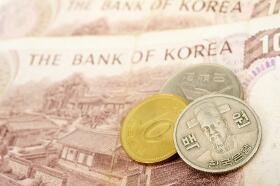The South Korean won is trading choppy in the middle of the trading week as investors begin to weigh the possibility of another lockdown related to the coronavirus pandemic. Despite South Korea flattening the curve in March, the nation has been experiencing an uptick in infections for most of August. The country is already in a recession, so another wave of restrictions could exacerbate the downturn.
So far, South Korea has more than 18,000 confirmed cases of COVID-19, with a death toll of just 312. However, one of Asiaâs strongest economies has reported about 3,000 infections in August, and the biggest single-day jump since the start of March.
During the early Wednesday trading session, the benchmark Kospi index and the won had slipped on concerns over Seoul imposing stricter social-distancing measures. Equities and forex markets pared their losses when the Ministry of Health denied reports that it would be going back into lockdown. Restrictions on operating hours and amplified social-distancing rules could negatively affect business activity and sentiment, especially at a time when it is still trying to recover.
Although it has slipped into its first recession since the Asian crisis in the 1990s, South Korean assets have rallied from the bottom in March. The Kospi has surged 60%, the won has gained roughly 8% against the US dollar, and the federal government slapped a ban on short-selling, which sparked record in-flows from retail investors. The benchmark 10-year government bond dipped to 1.405%.
The Bank of Korea has also signaled that it might not need to be ultra-aggressive in its policy easing, citing improvements in the overall economy. As a result, the central bank is anticipated to leave its interest rates unchanged at 0.5% during the August policy meeting on Thursday. The institution did hint at slashing the 2020 economic growth forecast.
That said, Bloomberg is noting that investors might be becoming accustomed to flareups and restrictions:
Still, South Korean assets could well remain resilient as recent experiences in Australia and New Zealand suggest investors are becoming accustomed to periodic virus flareups and restrictions. Australiaâs stock benchmark is near a five-month high and its currency is the strongest in about 18 months even as the nationâs second-most populous state, Victoria, is in lockdown.
On the data front, the Bank of Koreaâs consumer confidence index increased to 88.2 this month, up from 84.2 in July. Business confidence also climbed from 59 to 66. On Monday, analysts will comb through a plethora of data, including construction output, industrial and manufacturing production, retail sales, trade, and the gross domestic product.
The USD/KRW currency pair fell 0.15% to 1,185.69, from an opening of 1,187.49, at 15:58 GMT on Wednesday. The EUR/KRW slipped 0.36% to 1,400.72, from an opening of 1,405.56.
If you have any questions, comments, or opinions regarding the South Korean Won, feel free to post them using the commentary form below.
